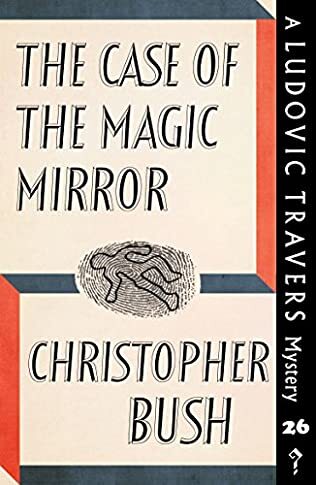The Case Of The Magic Mirror

A review of The Case of the Magic Mirror by Christopher Bush – 230413
The transformation of Christopher Bush’s amateur sleuth, Ludovic Travers, continues apace. It was shock enough to find that the once aloof and rather ascetic Travers had married, but in this, the twenty-sixth in the series, originally published in 1943 and reissued by those champions of neglected Golden Age crime fiction, Dean Street Press, it emerges he has a skeleton in the cupboard in the form of a three-year fling with the now Charlotte Craigne, née Vallants, during which he possibly fathered a son.
This rather large skeleton comes back to rattle his cage in what is a case that has much more personal jeopardy for him than is usually the case. It was also a situation close to Bush’s own heart as he was rumoured to have fathered a son, albeit from an extra-marital affair, an allegation he was never able to refute not did he ever acknowledge the boy’s paternity.
During the war years there is a distinct change in style and tone in Bush’s work. From the start of his wartime trilogy Travers has started to narrate the stories, as he does here, but there is beginning to emerge a darker, more pragmatic approach to the art of solving a case, perhaps, as the excellent Introduction suggests, as the result of the influence, conscious or unconscious, of the American crime writing fraternity. Certainly, here Travers is prepared to fight like a cornered tiger to preserve his reputation and his marriage, willing to counter blackmail with blackmail and to play his own game without much reference to his old police mucker, The “General” Wharton, who, as usual, eventually gets there but, without Travers’ assistance, takes a more circuitous route.
Travers has a new helpmate in the form of Frank Tarling, a professional private investigator drafted in to help disprove Charlotte’s claim that an illegitimate child was spawned from their affair. However, his role is expanded to encompass the two murders that form the meat of the case. The pair work well together, Tarling prepared to do the hard graft while Travers oversees matters.
The case itself is one of Bush’s better ones, both intriguing and complex. Its origins lie in a betting scam involving back-dated telegrams sent from rural post offices after the race has been run. Ina trial in 1937 at which Wharton shows professional interest and Travers comes along for the ride, the actor, Rupert Craigne, and his associates Sivley and Harper are jailed. The fourth man, a horse trainer, Rogerley, walks free. Sivley, who has received the harsher sentence, shouts as he is being led down that he has scores to settle when he is released. Sure enough, shortly after Sivley’s release Craigne and his father-in-law, Joe Passman, whom Wharton had suspected at the original trial as being implicated in the plot, are murdered within hours of each other and Sivley disappears.
Of course, the case is much more complex than a simple hunt for the obvious suspect, Sivley. It turns upon what the butler, Matthews, saw, in this case reflected in a Queen Anne mirror, the finest of its kind that Travers has ever seen and one on which he has his eye. Matthews pays for his inadvertent knowledge with his life.
The eminence grise in the tale is the marvellous Charlotte Craigne, a true femme fatale and the most formidable female antagonist Travers was ever to encounter, in the sleuth’s own words. He finds himself entangled in her web, used as a pawn to give herself and her seemingly estranged husband a cast-iron alibi. Although Travers has suspicions about what was really behind the murders, the scales only fall from his eyes when he sees a maid’s antics reflected in a mirror. It is another case where a behavioural tic gives an identity away.
The denouement gives the book a fantastic finale with Wharton playing the part of a Belgian to fine effect, although the main culprit escapes their judicial fate with a timely consumption of poison. It was a thoroughly entertaining and gripping case, one of Bush’s better ones, and kept me enthralled to the end.



